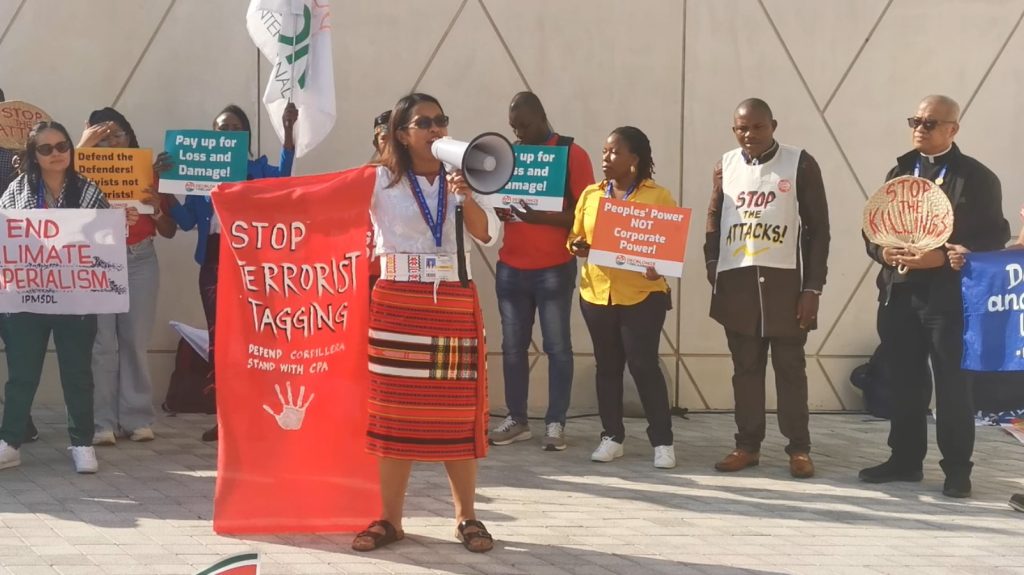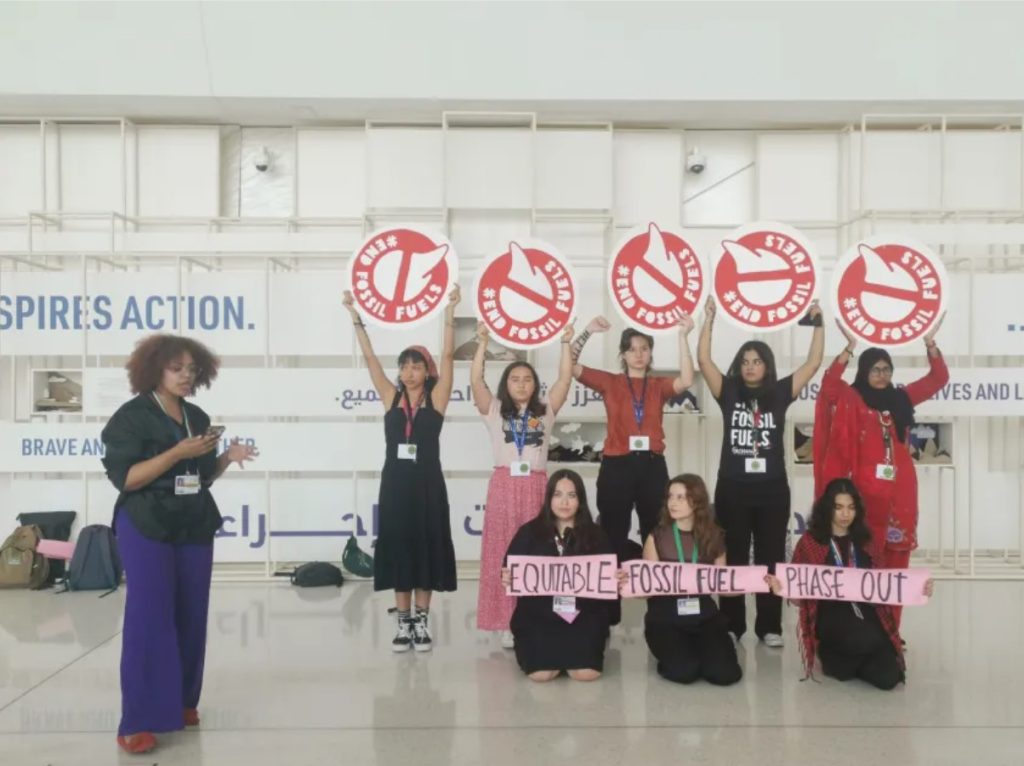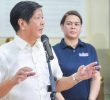
DUBAI – Just right at the entrance of the Expo City in Dubai where the 28th Conference of the Parties was held were climate activists and members of the civil society organizations calling for the phaseout of fossil fuel and demanding immediate climate action.
“Stop red-tagging!” read the text sewn on the red cloth held by Sarah “Bestang” Dekdeken, secretary general of Cordillera Peoples Alliance (CPA) during a protest on international human rights day. She and other environmental human rights defenders from Latin America and Africa among other countries came together to reiterate their call to stop the attack against environmental human rights defenders.
Bestang and other members of her group were in Dubai to register their demands to end destructive projects in their region and for the protection of environmental human rights defenders who are facing attacks for defending their ancestral land.
In the recent COP 28, activists and members of the civil society organizations (CSOs) described this space as restrictive as the secretariat of the United Nations Framework Convention on Climate Change (UNFCCC) set guidelines on how to conduct their protests such as requiring permission for protests.
But even with the restrictions, groups managed to express their dissent and discontent at COP28 especially it was held in the United Arab Emirates where the designated president, Sultan Al Jaber, is the head of the country’s national oil company. Protests are also prohibited in the UAE but with the COP 28, protests were permitted only within the confines of the conference venue.
Participation in negotiations lacking
Even if these calls of climate activists and CSO members’ reverberated at the venue of the COP, their voices were not heard at the negotiations of world leaders. Some of the CSOs were allowed to sit in as observers but not to participate in the negotiations.
“I was able to attend open meetings but we were not allowed to speak because these meetings are limited only to the Parties or governments,” Lia Mai Torres, executive director of the Center for Environmental Concerns (CEC) told Bulatlat in an email interview.
In the July 2022 report, Special Rapporteur on the promotion and protection of human rights in the context of climate change, Ian Fry, highlighted that those who are most affected by the impacts of climate change have the least participation and representation in political and decision-making processes.
Wanun Permpibul of Climate Watch Thailand and a member of the Asia Pacific Forum on Women Law and Development (APWLD) also said that even if meetings are open for CSOs, she said they were still blocked from attending the meetings of governments.

“Even the registration (to attend the COP), I think they should consider the number of observers and CSOs because in each year, it has been increasing,” she said, adding that there is a quota per organization to attend the COP which is very limited compared to the number of nominations they have put in.
She said COP should be an open space where people can express their concerns and air their opinion. “For example here we were talking about human rights in Palestine, it’s not only talking in terms of political issues, but it is also linked to the climate struggles because it’s colonization and the big corporations and those who are polluting countries are supporting and putting their finance to support the war,” she said.
“We need to face it and talk about it. You can’t talk about climate justice without talking about human rights violations that are happening in other parts of the world,” she added.
Bestang also said, “We want to reiterate to the governments the situation of the indigenous peoples on the ground. All the mitigation, adaptation, just and equitable transition are useless if they will not talk about human rights violations.”
Narrative should not be dominated by govt’s, corporations
Torres meanwhile said that while spaces like COP 28 have weaknesses and shortcomings, it is still important to attend it to understand what governments are talking about which would affect the people.

“The narrative must not be dominated in these areas by corporations and governments because the voice of the majority of the people is more important,” she said.
“By attending these spaces, we expose the true interests and commitments of corporations and governments. It should be communicated to fellow citizens and be the basis of our advocacies
For Bestang, the COP 28 is another venue to air grievances. “We are here at COP 28 to raise our voice and let the world know the situation of indigenous peoples because in the Philippines, (democratic) space is very limiting,” Bestang told Bulatlat in an interview.
Bestang was charged with cyber libel filed by former Police Regional Office Cordillera (PROCOR) Director Brigadier General R’win Pagkalinawan after condemning the demolition of the Anti-Chico Dams Struggle Monument. The structure pays homage to martyred environmental defenders including Macliing Dulag who fought against Chico River dam projects during the administration of the late dictator Ferdinand Marcos Sr.
“Governments here in the summit are pushing for hydropower dams which they see as a solution to the climate crisis. But for us indigenous peoples, this is a false solution. Even if this is a form of renewable energy, this kind of project is destroying the environment and biodiversity,” Bestang said, adding that projects like hydropower dams greatly affect not only indigenous peoples but the whole of humanity.
As of June 30 this year, there are 16 hydropower facilities in the Cordillera region in commercial operation. There are another 80 which are in its pre-development and development stage.
READ: Special Report | Push for renewables threatens lands and livelihood in the Cordillera
Meanwhile, for Azra Talad Sayeed of Roots for Equality and also a member of the APWLD, the space could be very confusing.
“For me if you are a rural woman who does not have access to literature, having a good understanding of what they are demanding it could be a very confusing space,” Sayeed told Bulatlat.
“I don’t want to try and say we can overcome that because it’s not a regular event where you can prepare them for this. I think the importance of rural women is to ensure that there is long term education and organizing around our issues which are the basic and the most critical demands that must be made here,” Sayeed said.
She also pointed out that even with the technical terms and philosophical discussions, people, including women should always be encouraged to still come to conferences such as COP.
“There is a learning curve, but they need to be able to say what their demands are and not be swayed by the very technical, very philosophical discussions that are happening here. They’ll get lost,” she added.

‘Beginning of the end of the fossil fuel era’
Meanwhile, at the end of COP 28, leaders of the world declared that they agreed to “transition away” from fossil fuel and dubbed it as “beginning of the end” of the fossil fuel era.
“I think it’s a big problem if it’s just the beginning of the fossil fuel era,” Torres said.
She explained that today, Filipinos are already feeling the effects of climate change, from remote mountains to the coastal communities and to the cities.
She also reiterated the need for collective action to demand the government to improve climate adaptation in the country.
“Furthermore, we need to demand the historically highest emitters to speed up and put more efforts to lower their emissions and commitment to the loss and damage fund and climate finance,” Torres said. (reposted by davaotoday.com)
DISCLOSURE: The author is a media fellow of the Asia Pacific Forum on Women Law and Development (APWLD).
climate change, COP28, environment, fossil fuel, Human Rights









